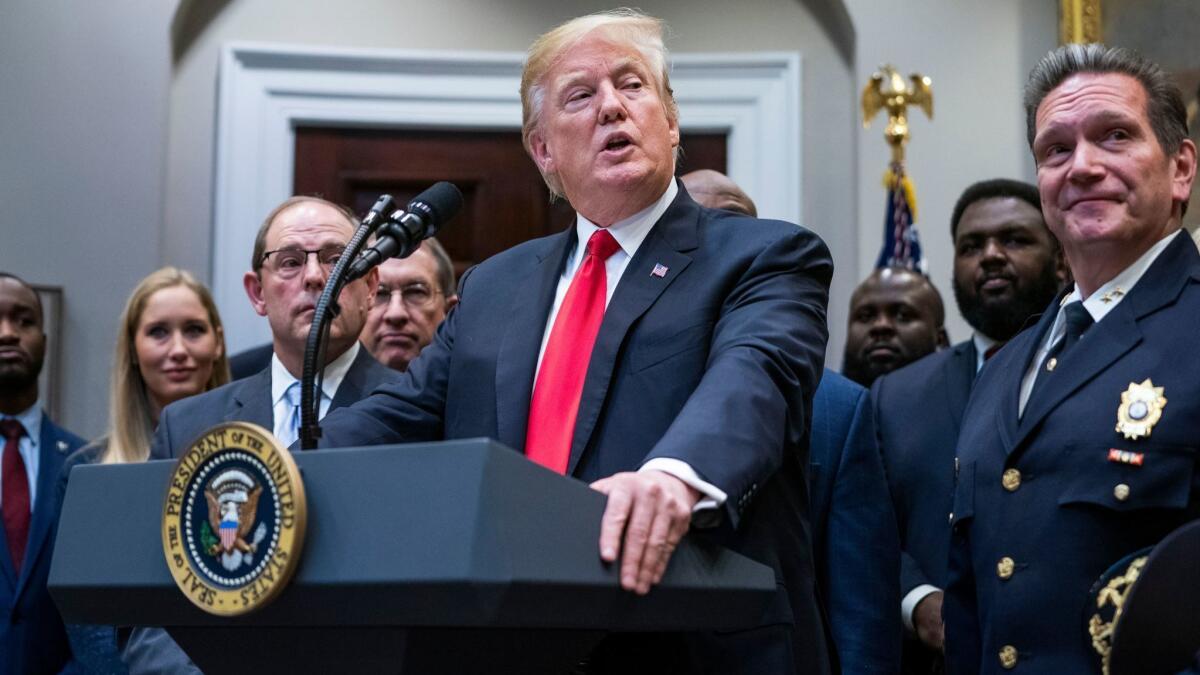Editorial: Bipartisan criminal-justice reform could happen soon — if the 1990s wing of the GOP gets out of the way

- Share via
A federal criminal-justice reform bill designed to make sentencing more rational and inmates’ return to society more successful has bipartisan support and last week won the backing of President Trump. But in the current topsy-turvy political landscape, that may not be enough. Continuing pushback from a key Republican lawmaker and an influential organization of sheriffs spotlights an essential element of the national criminal-justice debate: The fault line runs not between liberals and conservatives or Democrats and Republicans, but rather right through the conservative movement, the Republican Party and the president himself. It’s not clear that Democrats will be able to do much to resolve it.
The bill, known as the First Step Act, would move federal sentencing laws and reentry programs ever so slightly in the direction of reforms already adopted in many deep blue states such as California and many bright red ones such as Georgia.
Congress has already reduced sentences for crack convictions to bring them more in line with similar offenses involving powder cocaine, but the changes apply only to convictions handed down in 2010 or later. This bill would finally make those changes retroactive and would thus affect thousands of imprisoned, mostly African American men sentenced under the unfair drug laws adopted in the crime panic of the 1990s. It also would eliminate mandatory life-without-parole for repeat drug offenders and would reduce mandatory sentences for other drug offenses by a few years. It would reduce mandatory minimums for gun crimes (note — reducing mandatory minimums does not eliminate the availability of much longer sentences). And it would enforce laws and regulations that are already on the books but are not always followed — for example, applying good-conduct credits (although at a fraction of what is permitted in California and many other states) and providing rehabilitative services and education.
Long sentences keep thousands of Americans locked up well after the punitive or rehabilitative value of the incarceration has been exhausted.
These changes are overdue. Long sentences keep thousands of Americans locked up well after the punitive or rehabilitative value of the incarceration has been exhausted. The bill returns some discretion to judges to make the sentence fit the crime.
Some of the more vocal opposition to the bill comes from the left and is of the “It doesn’t go far enough” variety. And of course it doesn’t. The bill is modest in the extreme. From 2015, when it was first introduced in Congress, to today, one state after another has eased three-strikes laws and reduced the toughest sentences for drug crimes short of major trafficking. The bill doesn’t bring the federal system up to speed with the states.
For all its modesty, though, it’s a good bill, and if they are smart, Democrats and Republicans, the House and the Senate, will join and adopt it during the lame-duck session before the new Democratic majority takes over in the House and members rejockey for position. After the election, Trump and Senate Majority Leader Mitch McConnell both trotted out calls for bipartisanship, so the bill gives them a chance to follow through.
Standing in the way is, among others, Republican U.S. Sen. Tom Cotton of Arkansas, who recites criticisms that seem to come directly from the most panicky shadows of the 1990s, or for that matter, the 1950s. Cotton has called the effort the “jailbreak bill” because of the sentencing reforms.
Enter the Fray: First takes on the news of the minute from L.A. Times Opinion »
Cotton’s opposition to earlier iterations of the bill spotlight the conservative split. Many conservatives have come to question tough sentencing laws, seeing them as contrary to bedrock values of small government, fiscal discipline, personal responsibility and family preservation. The “Right on Crime” movement has worked to recapture from liberals the moral leadership on criminal-justice reform. At the same time, tough-on-crime Republicans like Cotton (and recently departed Atty. Gen. Jeff Sessions) remain influential.
As for Trump, he has a foot in each camp. He campaigned as a traditional tough-on-crime conservative and backed Sessions on criminal issues. Earlier this year, he called for the death penalty for drug dealers — presumably some of the same people whose current mandatory life sentences could be reduced to 25 years under First Step.
But the bill has been strongly pushed by Trump’s son-in-law, Jared Kushner, and the president has now signed on. Most of the signals are good. Congress would be wise to act quickly, before the notoriously mercurial president changes his mind.
Follow the Opinion section on Twitter @latimesopinion and Facebook
More to Read
A cure for the common opinion
Get thought-provoking perspectives with our weekly newsletter.
You may occasionally receive promotional content from the Los Angeles Times.









